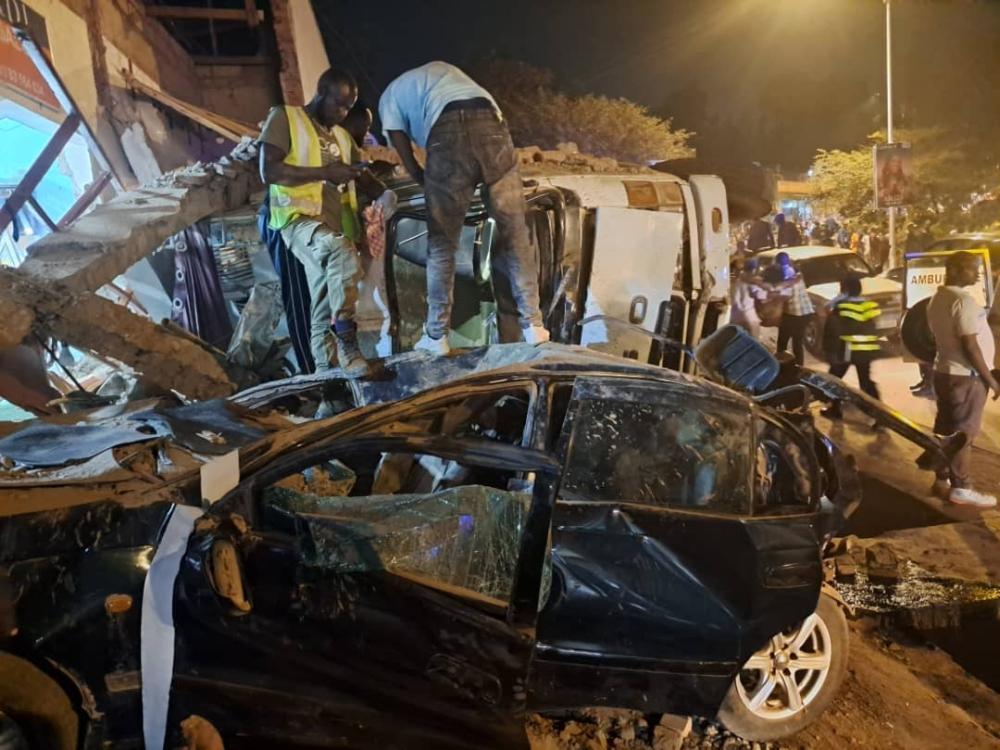Africa-Press – Rwanda. It was close to midnight when the phone rang. My brother had been in an accident. At that moment, time felt like it had frozen. You realize how quickly life can change – one second, someone is walking, breathing, laughing, and the next, they are being rushed into an emergency room.
Hospitals are places where life and death meet every single second. The sound of a defibrillator, the urgent counting of a nurse performing CPR, the cries of families waiting outside — it’s all part of a fragile, delicate balance. That night, I learned that life can be so precious, yet so fragile, and that we often forget to honour it, until it’s almost gone.
There are moments in life that change the way you see the world. For me, it began with a phone call I almost ignored. It was late Tuesday night, July 29, 2025 — around 11 p.m. — when my elder brother’s trembling voice delivered the news. Our other brother had been in a terrible accident on the Kigali–Rubavu road, near Kirenge, just a few kilometres from Shyorongi. He had been rushed to CHUK in critical condition.
The accident had left my brother unconscious. In the emergency room, doctors moved fast. They checked his vital signs: heartbeat, breathing rate, blood pressure, and oxygen level. These are the four basic indicators of life. When they saw his breathing was shallow, a nurse quickly brought an oxygen mask. Oxygen is something we take for granted, yet without it, brain cells start dying within four minutes.
But even with oxygen support, he could not sustain breathing on his own. That is when the doctors decided to perform a tracheostomy, a surgical procedure where a small hole is made in the throat and into the trachea, allowing a tube to be inserted. Through that tube, a ventilator could push air directly into his lungs.
For most of us, breathing is automatic, we don’t even think about it. But sitting there, hearing that my brother needed a machine and a plastic tube in his throat just to stay alive, changed my whole perspective. The air we pull into our lungs every second, without effort, is not guaranteed. In those moments, you realize life is balanced on the thinnest of edges.
The lesson here is simple but deep: never wait for a crisis to value your body. Every heartbeat is a gift. Every breath is a miracle.
As I sat in that hospital, I thought of people walking outside, free and unaware of the blessings they carry. To walk without pain, to drink a glass of water, to hug your child, these are silent miracles. Yet we often live complaining about what we don’t have.
There are patients who need dialysis, a machine that cleans the blood when the kidneys fail. They spend five hours, three times a week, connected to tubes, waiting for blood to be filtered. Still, many of them are the happiest people you’ll meet. They laugh. They tell stories. They know the value of life more than many of us who take it for granted.
Happiness is not being in perfect health, or being so wealthy; it is in gratitude.
The accident made me reflect on how every small choice matters. Speeding on a road, ignoring safety rules, smoking, and drinking excessively all carry consequences. Doctors in an intensive care unit often say: “We don’t treat diseases only. We treat decisions.”
Someone who ignores high blood pressure may end up with a stroke. A person who drives drunk may end up in trauma surgery. Small habits accumulate. That’s why we need to take care of ourselves every day: exercise, eat well, rest, and manage stress. Prevention is more powerful than cure.
In Rwanda, I saw organizations like Solid Africa feeding patients who couldn’t afford meals. I saw nurses cleaning wounds at 3 am without complaining. I saw doctors making quick decisions during triage, the process of deciding which patient to treat first when there are many emergencies.
Mutuelle de Santé, our community health insurance scheme, gives families a chance to access care with dignity. Without it, many would face impossible bills. This reminded me that healthcare is not just medicine; it is humanity.
The heroes of our world are often not on TV. They are in hospitals, wearing gloves, holding hands, giving injections, and saving lives quietly.
I once met a young man with chronic kidney disease, hooked up to dialysis three times a week. Each session lasted five hours. Yet he smiled more than many healthy people I know. He told me: “Life is too short to complain. Even pain is proof that I’m still alive.”
His words stuck with me.
Why do we wait for tragedy to change our perspective? Why do we need an accident, a sickness, or a loss to remind us of the gift of life? We shouldn’t. Every morning is a chance to start fresh, to live better, to forgive, to love more deeply.
There are families who haven’t spoken in 10, 15 years. Parents and children who hate each other. Brothers and sisters who don’t look at each other anymore. And I ask: for what? Life is too short.
In the hospital, I saw sons holding the hands of their dying fathers. I saw mothers crying for daughters they once quarrelled with. At that moment, all pride disappears. What remains is love. Why wait until the last moment? Call your brother now. Forgive your parent now. Visit your friend now. Reconciliation is a medicine for the soul.
First Lady Jeannette Kagame once said: “A family is a small Rwanda.” I always remember that. The peace, love, and dignity we want for our nation must begin at home.
If your family is broken, work on healing it. If your home is filled with anger, replace it with forgiveness. Teach your children to value empathy, discipline, and honesty. A home of love creates a community of love. And a community of love builds a nation of peace.
Every day, we make choices. To eat well or badly. To forgive or hold grudges. To work hard or waste time. To love or hate. These choices seem small, but together they shape destiny.
Learning never ends, whether it’s emotional intelligence, leadership, communication, or empathy. We must be students of life until our last breath.
That night in the hospital changed me. I realized life is not about waiting for miracles. Life itself is the miracle. Every breath, every smile, every family dinner, every hug, they are sacred.
So, live with dignity. Walk with integrity. Speak with kindness. Forgive quickly. Love deeply. And remember: you don’t have to wait for tragedy to wake up to life.
The writer is a Rwandan journalist passionate about storytelling and using media to inspire positive change.
For More News And Analysis About Rwanda Follow Africa-Press






